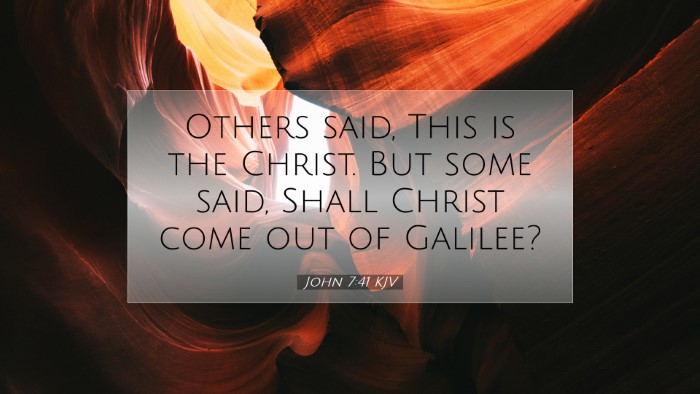Commentary on John 7:41
Verse: John 7:41 - "Others said, This is the Christ. But some said, Shall Christ come out of Galilee?"
Introduction
The seventh chapter of the Gospel of John presents a rich tapestry of responses to Jesus' identity during the Feast of Tabernacles. In verse 41, we observe the division among the people regarding His messianic identity, which serves as a crucial turning point in the narrative.
Contextual Background
The context of John 7 reveals the tension between Jesus and the religious authorities, alongside the confusion among the people. This atmosphere of uncertainty regarding Jesus’ true identity is characteristic of His ministry. The Feast of Tabernacles, a time of celebration and reflection on God’s provision, becomes a backdrop for deeper revelations about the true nature of the Messiah.
Commentary Insights
-
Matthew Henry:
Henry emphasizes the division among the populace, highlighting the contrasting beliefs that Jesus engenders. He notes that while some affirm Jesus as the Christ, others exhibit skepticism based on preconceived notions about the Messiah's origins. This illustrates a critical theme in the Gospels where societal beliefs shape individual understandings of Jesus’ identity.
-
Albert Barnes:
Barnes elaborates on the question posed in the verse: “Shall Christ come out of Galilee?” He points out that the prevailing belief at the time was that the Messiah would emerge from Bethlehem, as prophesied in Micah 5:2. Barnes underscores this lack of knowledge of Jesus’ true birthplace (Bethlehem), which is pivotal in understanding their confusion. This ignorance reflects the dangers of relying solely on tradition and external signs rather than seeking a personal revelation of Jesus.
-
Adam Clarke:
Clarke delves into the theological implications of the people's reactions. He notes the significance of their assertions: “This is the Christ,” and the counter-argument that arises from their misunderstanding of prophetic writings. Clarke accentuates the irony of their expectations versus the reality of Christ’s ministry, suggesting that God’s ways often defy human understanding and cultural expectations.
Theological Reflections
The reactions encapsulated in John 7:41 invite deeper theological reflection on the nature of belief, authority, and revelation. The conflict between acknowledging Jesus as the Messiah and the hesitation rooted in traditional interpretations highlights the adaptive nature of faith. Believers today can be challenged to re-examine preconceived notions about Christ and engage with scripture and revelation earnestly.
This verse serves as a reminder of the importance of personal engagement with the Word of God and the Holy Spirit's guidance in understanding who Christ is. It also calls for humility in our theological assertions, recognizing that divine revelation often transcends human expectations.
Application for Today
The division among people regarding Jesus in this verse is still relevant today. As pastors, students, and scholars engage with the Scripture, the question arises: Who do we say Jesus is? Like the crowd in John 7, the contemporary world is rife with varied interpretations of Jesus’ identity. This invites a call to authenticity in our witness as we present the Christ to others.
Moreover, the skepticism depicted in the crowd illustrates the critical role of discipleship in spiritual formation. It emphasizes the necessity for believers to not only proclaim Christ but to foster environments where questions can be explored, and people can encounter the living Christ beyond traditional confines.
Conclusion
John 7:41 serves as a pivotal moment in understanding the complexities surrounding Jesus’ identity. The insights gathered from esteemed commentaries reveal that while the people were understandably confused based on their expectations, the truth of Christ stands apart from human limitations. Engaging with this text requires an openness to the transformative power of Jesus that transcends societal constructs and traditional boundaries.
As we continue to study and teach the Scriptures, let us aim to present a Christ who surpasses all expectations—a Savior who invites each of us into a relationship that reshapes our understanding and reveals the fullness of His glory.


